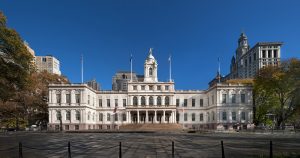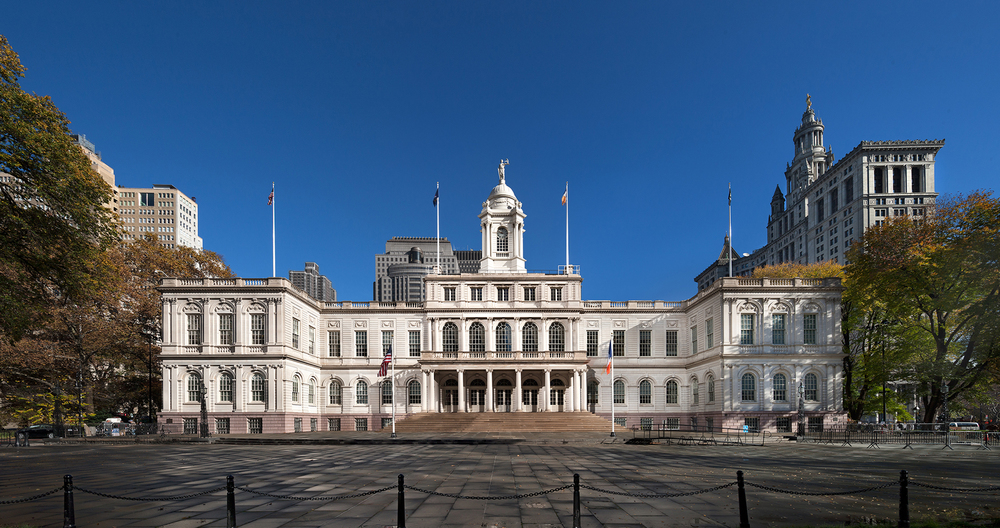Testimony delivered by DeNora Getachew, New York City Executive Director of Generation Citizen to Joint Hearing of the New York City Council’s Education and Youth Services Committees regarding Youth Civic Engagement Opportunities. Read on!

Good Afternoon Members of the City Council’s Education and Youth Services Committees:
My name is DeNora Getachew and I’m the New York City Executive Director of Generation Citizen, a nine-year- old national nonpartisan, nonprofit organization dedicated to educating and empowering the next generation of civically engaged citizens. Thank you for the opportunity to testify at today’s timely and important hearing about the youth civic engagement opportunities. Thank you to the City Council for investing $1 million in Generation Citizen over the last two fiscal years. We could not have scaled our local impact to educate and empower over 7,000 New York City public school students without the Council’s investing in our Action Civics program.
America is experiencing a civic reckoning, partly as a result of the aftermath of the tragic events in Parkland, Florida and the incredible leadership and vision shown by the young leaders there in the face of their tragedy, but also due to the particularly politically divisive politically climate we are living in right now. Society is finally realizing what many academics and advocates have known for a long time, political disengagement and illiteracy are rampant, especially in our city and our nation’s most underserved communities.
Generation Citizen, or GC, uses two models to implement our Action Civics curriculum: college volunteer, or Democracy Coach model; and teacher-led, professional development model. Our two models are unified by a shared Action Civics curriculum, our innovative approach to advocacy planning and support, and supplemental resources for students, teachers, and schools.
The key components of Action Civics are that:
- It must be student-led and personally affect the students;
- Students must conduct research and analyze the root causes of their issue, and develop an action plan or a goal;
- Students put plans into action by meeting with target legislators and policymakers and by drafting legislation, proposing budgetary solutions or advocating for increased youth voice in government decision-making affecting the issue;
- Students present their action plans to community leaders at our end of semester capstone event, Civics Day;
- Students must have an opportunity to reflect and explore concrete ways to remain active, politically engaged citizens beyond the classroom; and
- Students become prepared and motivated for long term political engagement.
Through Action Civics, students learn about democratic structures and processes by directly engaging with them, as well as with each other, to address one or more issues they care about, such as affordable housing, bullying, gun violence, police brutality, or sexual assault – the top issues in GC NYC’s classrooms this year. Students learn valuable academic and life skills, like public speaking, collaboration, critical thinking, and how to work through difference. They also gain firsthand experience engaging in an important lifelong habit, understanding how they can directly inform and influence change in their community through the democratic process.
GC has educated and empowered approximately 14,000 students nationwide this year through our work in New York City and 5 additional sites: Rhode Island, where we were founded on Brown University’s campus; Massachusetts; the Bay Area, California; Oklahoma City, Oklahoma; and Central Texas, as well as piloting “remote programming” in San Diego, California; and Camden, New Jersey.
GC is on the front lines arming the next generation with the knowledge and skills to participate in twenty-first democracy and not just be slacktivists. While our mission is to bring civics education to all students, we focus on addressing those impacted by the “civic engagement gap” plaguing our society. Research shows that people nationwide are receiving unequal civic learning opportunities and that students in low-income schools, when compared with just average socioeconomic status schools, are 50 percent as likely to study how laws are made, and 30 percent less likely to report having experiences with debates or panel discussions in social studies classes. So in NYC, and in our 5 sites nationwide, we focus on the most underserved communities. We are cultivating the New American Majority to engage in democracy as a way to bring equity back into our democracy.
While there are many reasons for the lack of overall civic participation, one root cause of the problem is that civic engagement is not seen as a high priority in our schools today, and too much of our efforts are focused on elections and the experience of voting. But that’s just one action on one day. GC believes Action Civics is a concrete and systemic solution to re-engage young people in the local political system for the long-term, and to collectively strengthen our democracy.
Thanks to the New York City Council’s $1,000,000 investment through the Civics Education in Schools Initiative in Fiscal Years 2017 and 2018, Generation Citizen New York City has:
- Educated over 7,000 middle and high school students in over 50 New York City public schools.
- Launched college partnerships with 4 new CUNY colleges – Baruch College, John Jay College, Medgar Evers College, and Queens College, and deepened our partnership with Hunter College to recruit over 200 Democracy Coaches (college interns) to co-teach Action Civics and serve as peer-to-near peer mentors to public school students.
- Cultivated the future civic workforce by providing CUNY college interns with stipends for teaching Action Civics in over 280 New York City public school classrooms.
We are excited by the de Blasio Administration’s Civics for All initiative through the equity and excellence umbrella. As the City’s largest Action Civics provider, which has educated over 18,000 students since launching the New York City site in 2011, we look forward to working with the Administration to develop and scale Civics for All using GC’s Action Civics curriculum and pedagogy, and make New York City a national model for effective civics education.
GC is not naive enough to think that our work in the classroom alone can save our democracy. We know that Action Civics is the start of a young person’s lifelong civic journey. We also know that there is too much emphasis on getting our youth to vote and not enough emphasis on how to engage them in the spectrum of civic engagement activities. That’s why we created this Go Beyond the Ballot toolkit, which articulates 6 clear ways that our young people, and adults too for that matter, can stay civically engaged. I call the Committees’ and administration’s attention to the toolkit as you work together to consider ways to build out local programming to encourage youth to further their civic journey.
On the point of civic engagement opportunities beyond the classroom, last fall we submitted comments in response to the Department of Youth and Community Development’s Summer Youth Employment Concept Paper. In our submission, we recommended that SYEP should be expanded to include additional focus areas, such as government and civic professions. We believe such internships, similar to GC’s Community Change Fellowship (CCF), can help stem the civic engagement gap, while simultaneously ensuring that the city is cultivating the future civic workforce.
By way of brief overview, GC’s CCF program is a six-week summer youth leadership development program for alumni of our in-school Action Civics program who have already demonstrated their commitment to civic engagement. Fellows work four days per week at a government agency, elected official’s office, or advocacy organization to apply their civic knowledge and skills in the workforce. GC also provides Fellows with professional development and workforce readiness skills – from workplace communication to resume writing — as well as coalition-building, policy research, storytelling, and media training to prepare them to share their civic engagement stories and learn how to leverage the media to advocate for policy change.
I would be remiss if I did not mention other youth civic engagement pipelines like Participatory Budgeting; Youth Leadership Councils; Student Voter Registration Day, which GC has participated in since its inception; and Community Boards where 16 and 17-year-olds can serve thanks to successful advocacy by GC and other coalition members.
If we continue to deemphasize civics education in our schools, it’s no wonder that young people do not understand the importance of democratic participation. GC recently released a bold plan to reinvigorate civics education nationwide, using three strategies over the next three years: (i) strengthening our existing program; (ii) expanding our program portfolio to prove the efficacy of the model in rural communities; and (iii) advocating for Action Civics for all students statewide leveraging the state-mandated Participation in Government one-semester civics course. On the latter subject, GC NYC recently hosted a policy conference with the Center for Educational Equity at Teachers College, Columbia University to discuss how we can reinvigorate civics statewide. We look forward to partnering with the Council to shape our state advocacy agenda.
We appreciate the Council’s vision and leadership investment in GC to ensure that the next generation of New Yorkers develops the civic knowledge, skills, and agency necessary for them to become active and engaged stewards of our 21st-century democracy for the long-term. I will now ask Anyhara Garcia, alumna of GC’s Action Civics program from the International High School for Health Sciences, to share a youth perspective about how Action Civics can empower young people to become civically engaged.
Thank you to the Committees for your consideration of this testimony.
